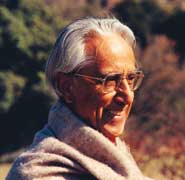




Invisible harmony
The inner harmony I am referring to is manifested in the spontaneous and creative way in which we may be able to deal with one particular religion because we are really at home there and able to simplify, to relate disparate things, or put practices together. ... When dealing with a religion at that level we should speak ex abundantia cordis et menti, more than from a catalogue of propositions. .. Any authentic religious dialogue dispels misunderstandings from both sides and calls for rectifications and new interpretations.” (Invisible Harmony, Essays on Contemplation Responsibility, Minneapolis 1995).
The invisible harmony is the harmony that ought to exist among all religions and cultures, the same harmony as exists in all of reality. Panikkar’s thought with regard to the relationship between the distinct religions of the world is the opposite of elaborating a universal theory of religion based on an attempt to reach an intellectual and global understanding of all religions (an equalizing ecumenism, a comparative religion, or an “ecumenical Esperanto”). For RP, it is rather a matter of discovering the “invisible harmony” of all religions and cultures, of all reality. The search for a “universal theory” fosters dialogue, but runs the risk of imposing its own language, and “the supremacy of the logos over pneuma”, reason, the power of the word, over the spirit (Invisible Harmony).
As opposed to this, we must open ourselves to others and believe in, have faith in human experience as a whole, in the harmony of human beings and of the cosmos. Particularly, in the religious phenomenon, for if religion has led to the greatest catastrophes and made manifest the most base human passions, so too “have the most sublime human experience taken place there”; and religion has more than anything else revealed “a certain totality”, “religion is the symphony, not merely the musician”.
It is what RP calls the “pars pro toto” effect (cf. below): each of us can be conscious of the all, but from a particular perspective. The all is always appealing (and healthful, adds Panikkar) to us, and “something is complete when it has an inner harmony”, the all suggests knowledge, but also beauty and goodness.
official site